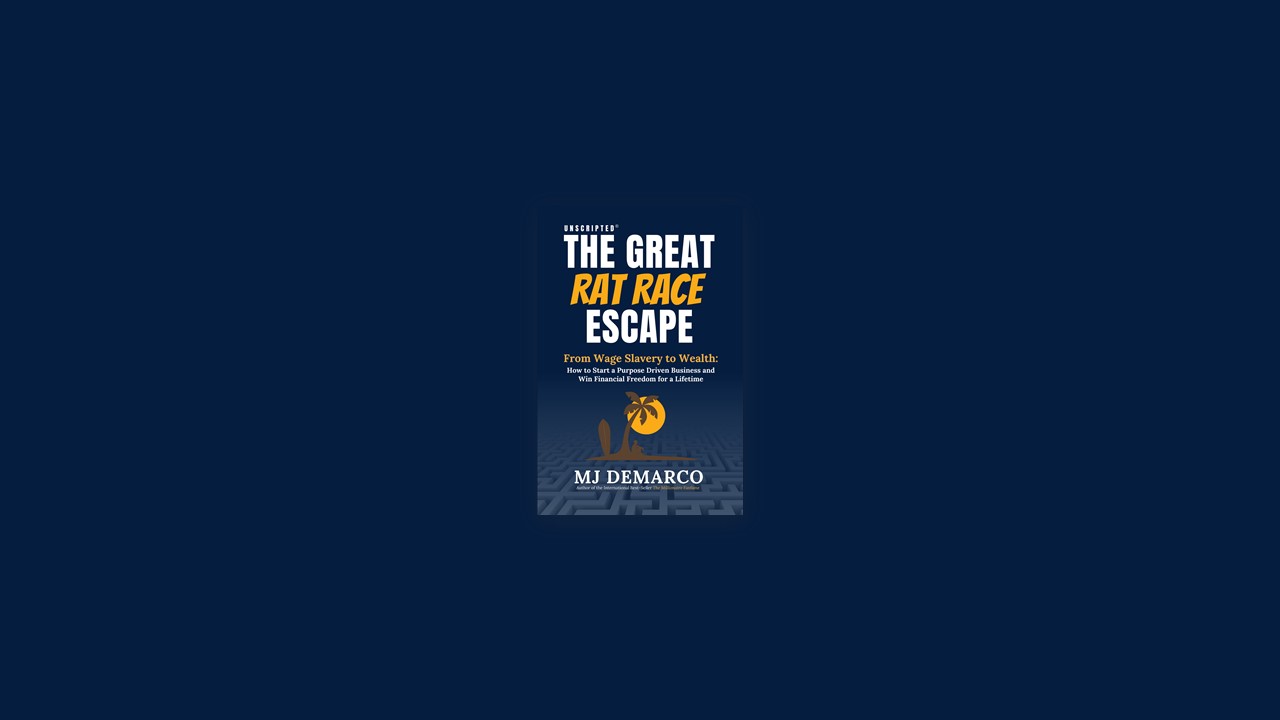Kindle | Hardcover | Audiobook
The Conventional Wisdom Principle
The “wisdom of the crowd” advocates for the rat race, not for your freedom.
Question conventional wisdom or have it lead you into a conventional life.
The Script administrates the rat race and is culture’s default operating system, bankrolled by powerful institutions and corporations.
The Someday Principle
Someday is a lie, code for never.
Someday is an excuse for inaction, a mental bribe to dismiss today for a tomorrow that never comes.
Someday is like betting on a fractal to end.
Someday must become today.
The Economic Religion Principle
Regard the rat race like an economic religion, a cult of unwitting participants.
You participate in the rat race in one of two roles: a shopping-rat or a savings-rat.
A shopping-rat is a slave to consumption (of goods and media), a savings-rat is a slave to his savings and portfolio.
When a shopping-rat questions the rat race, culture promotes the other rat race role, a savings-rat.
The Script, or rat race dogma, has six components: [S]chooling [C]onsumption, [R]esponsibility [I]gnorance [P]romises, and [T]axation.
The Honeypot Principle
Compound interest, or the Slowlane, is the idea that one dollar saved today will be worth millions in the distant future.
The spending- and savings-rat are symbiotic, two sides to the same rigged coin.
Inflation, time, and many lofty assumptions neuters compound interest.
Data supports that compound interest, when applied in real life with real life circumstances, is grossly ineffective.
The stock market isn’t making investors wealthy; it makes its sycophants wealthy.
Via mass marketing, champagne hypocrites get rich selling a “get rich” strategy that didn’t make them rich.
In the same way a prison doesn’t give its inmates directions for escape, the rat race doesn’t either.
The Discounted Time Principle
The time value of money states that money today is always more valuable than money later.
The time value of money is a universal concept taught at every university on the planet, while the discounted time value of time isn’t taught anywhere.
Freedom young is always more valuable than freedom old.
Whenever the rat race marginalizes time and treats it as a mathematical variable for financial freedom, you’re being propagandized.
The Offense/Defense Principle
Financial freedom is won on offense (income/asset), not defense (expense/debt reduction).
“Live within your means” with the intent to expand your means.
You can live a luxurious life and still live within your means.
A poor defense can destroy a strong offense, as in the case of famous athletes, lottery winners, and celebrities who go bankrupt.
The Money-System Strategy
Old money, or savings, gives birth to new money, often completely passive.
A money-system is the business of renting capital, a considerable cash sum invested in income-producing assets (dividends, bonds, real estate trusts) that produce regular monthly or quarterly income.
For compound interest to be effective, you need to start with a large sum.
A boring four percent return on $5,000,000 is more than $16,000 monthly, without touching the principle.
Your money-system should only represent a small portion of your net worth.
Your business is for creating wealth; the capital markets are for renting your wealth which pays you passively.
The Escape Number Strategy
Basic existence expenses are terribly expensive, even in a minimalistic living situation.
Expect a life of unrestricted freedom and relative affluence to cost millions.
The Escape Number is the sum of the pre-tax earnings needed to purchase the assets specified at your ten-year vision, plus the pre-tax investment sum which funds the carry-cost for your dream lifestyle, plus additional pre-tax funds for economic immunity.
When calculated on a pre-tax basis, the Escape Number can seem incredibly large
The Knowledge Gap Strategy
What works today doesn’t work tomorrow.
The knowledge gap is the ever-growing space between what you don’t know and what you need to know, caused by shifts in tastes, technology, and human behavior.
Only persistent learning can shrink a knowledge-gap, preceded by acknowledging its existence.
The Consumer/Producer Principle
Math doesn’t lie, people do.
Rats play for Team Consumer, scientists for Team Producer.
Your annual report represents the numbers in your financial life and determines your chances of a rat race escape.
The five key numbers in your annual report are Gross Annual Production (GAP), Gross Annual Consumption (GAC), Annual Net Existence (ANE), Net Worth (NW), and Annual Research & Development (R&D).
The rat race automatically drafts you to be on Team Consumer.
To succeed on Team Producer, focus on your R&D and aim to learn the language of scientists… business, finance, marketing, management, etc.
Your Annual Net Existence determines if you are a net producer or a net consumer for the year.
Your net worth, the sum of ANE, indicates your current role in the rat race; positive = scientist, negative = rat.
The Passion Principle
Passion is a horrible business model.
Passionate pursuits likely have increased competition due to surplus supply, depressed margins due to commoditization, limited differentiation, diminished leverage, and poorer probabilities.
Lasting, enduring determination comes from purpose, not passion.
There are no passionate losers who get the stage and the spotlight.
Passion should follow your effort and its favorable results from self-improvement and character building.
The Process Principle
The event is a short, visible, and celebratory accomplishment; the process is the enduring sweat and grind that made it happen it.
Culture is event-oriented, often derelict or neglecting process.
The secret to success is no secret, it just never finds a headline.
The Problemology Principle
Entrepreneurs are problemologists.
An entrepreneur solves one macro-problem, their relative-value, by solving dozens, perhaps hundreds of smaller micro-problems.
The Rules and Risks Strategy
Rules are like flimsy bubbles.
Know why you follow certain rules… tradition, culture, or evidence based?
Rule-breaking gives you a better chance at standing out from the crowd.
The Execution Principle
Your great idea is absolutely worthless until execution says it isn’t.
Your idea is like a multiplier, while execution is where the money goes asymmetrical.
A mediocre idea with great execution could be worth tens of millions.
The 3A Strategy
The execution process for Unscripted Entrepreneurship is like applying the scientific method indefinitely, not in a laboratory, but a marketplace.
The 3As mimic the scientific method consisting of Act, Assess, and Adjust.
Act is the experiment itself—your offer placed in front of the market.
Assess is the experiment’s evaluation.
Adjust is a minor shift in strategy which retests the original experiment.
The 3A process is iterative and never ends.
The Purpose Driven Strategy
A strong Purpose—a why—is the only motivational fire you can count on to get through the Desert of Desertion.
A weak purpose compels dithering and makes you bribable to comfort and excuses.
The “billionaire thought experiment” can help you uncover your purpose.
The “Living the Dream” Principle
Unhappiness, or a dead dream, is the business model of the modern world.
You “live the dream” whenever you have a dream that is alive and pursued.
The regret of failure is temporary; the regret of never trying is permanent.
Entrepreneurship is more than a career, it’s a revolution for your life and family.



